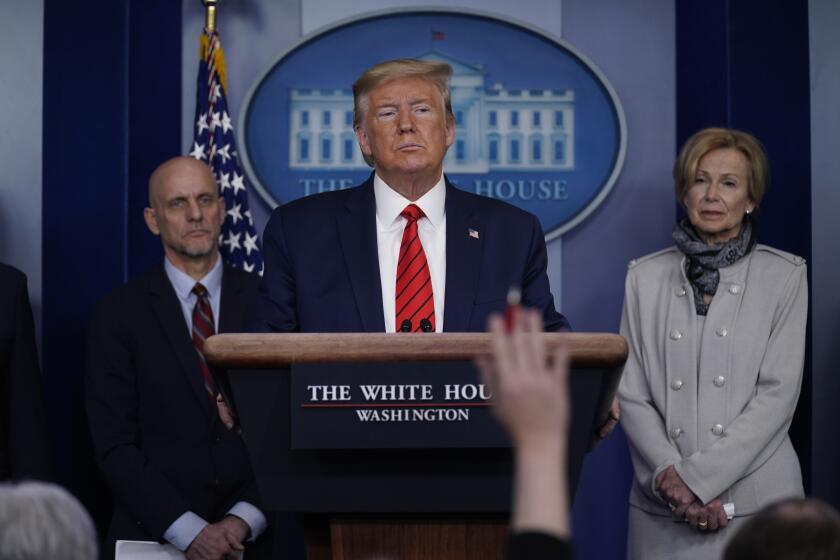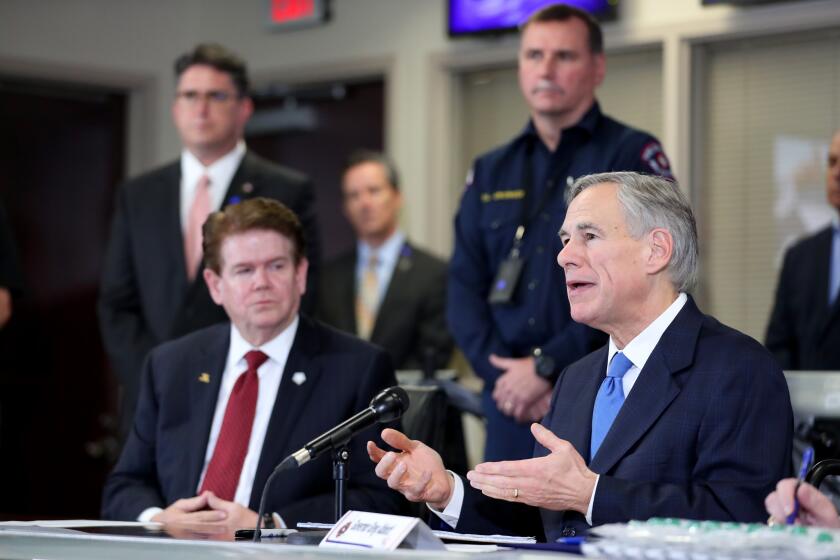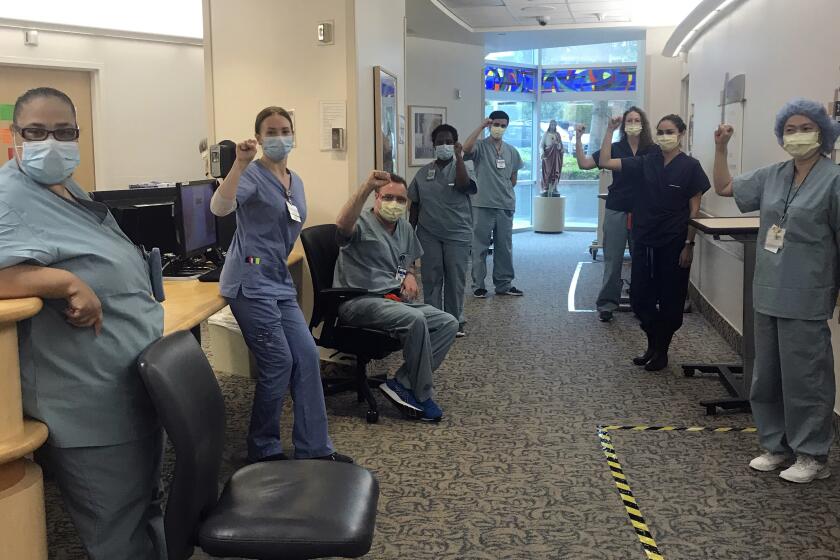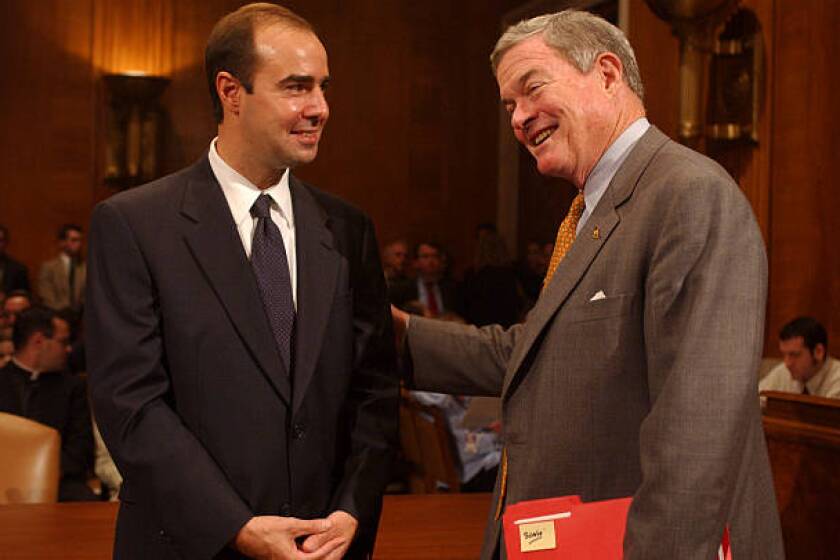Column: A century later, meatpacking plants still resemble Upton Sinclair’s depiction in ‘The Jungle’
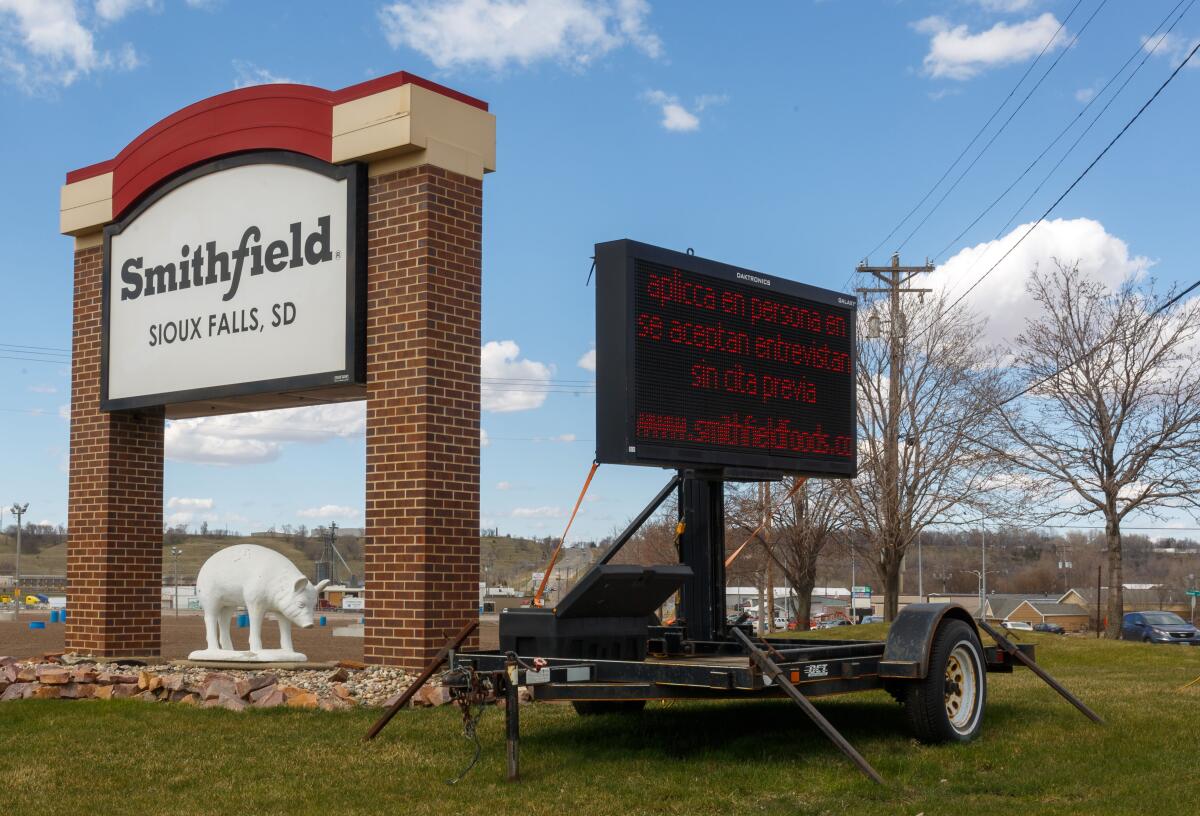
- Share via
In the uplifting stories we tell ourselves, muckraking investigations of corporate misdeeds create a public uproar that leads to the eradication of the abuses exposed.
The coronavirus crisis presents us with a dispiriting counterexample. It’s the meatpacking industry, which was the subject of Upton Sinclair’s novel “The Jungle,” published in 1906.
Descriptions of conditions in modern meat processing plants resemble those depicted by Sinclair. They include workers crammed virtually shoulder-to-shoulder to tend production lines moving at inexorable speeds, high rates of worker disease and injury, low pay and unforgiving rules on time off or meal and bathroom breaks.
This is an attempt by Smithfield to claim it can self-regulate. The companies will get free hands to do whatever they want, and we’ve seen what happens when that occurs.
— David Muraskin, Public Justice
“These places are injury factories,” says David Michaels, who headed OSHA during the Obama administration and is currently a professor of environmental and occupational health at George Washington University.
Conditions in the plants have become even more unhealthy in the COVID-19 crisis, according to allegations in a federal lawsuit filed against Smithfield Foods, a leading pork processor, by an anonymous employee at the company’s Milan, Mo., plant and the Rural Community Workers Alliance, an advocacy group.
The lawsuit asserts that the plant provides workers with “insufficient personal protective equipment;...schedules their worktime and breaks in a manner that forces workers to be crowded into cramped hallways and restrooms,...refuses to provide workers sufficient opportunities or time to wash their hands.”
The company even offered workers a $500 bonus if they worked all scheduled hours during the month of April without missing a shift.
That was “a substantial incentive for workers to continue working at the plant even when they are experiencing symptoms,” the lawsuit asserts. The plaintiffs are seeking a court order requiring the company to meet stringent antivirus standards. The plant employs 1,187 workers at wages of $14-$25 an hour, the company says.
In recent days, alarm about the economic impact of the novel coronavirus have turned conservatives who weeks ago were boasting about the shrinking of the U.S. government into raving Keynesians, proclaiming the virtues of deficit-financed economic stimulus.
Smithfield told me by email that it considered the lawsuit to be “full of specious allegations that are without factual or legal merit” and that it was “based on speculation, hearsay, anonymous declarations, and outdated information.” The company said in a legal brief filed April 29 that “not a single person at the Plant has been diagnosed with COVID-19.”
Yet a photograph of a break room that Smithfield filed with the court shows its seats to be separated from one another by only a few feet and a flimsy barrier. At least one other Smithfield plant, moreover, has been identified as a COVID-19 hot spot where infections ran rampant.
That’s the firm’s pork processing plant in Sioux Falls, S.D., which last month became the location of the nation’s worst coronavirus infection cluster, with 518 having tested positive and 126 more cases of nonemployees who became infected when they came into contact with a Smithfield employee.
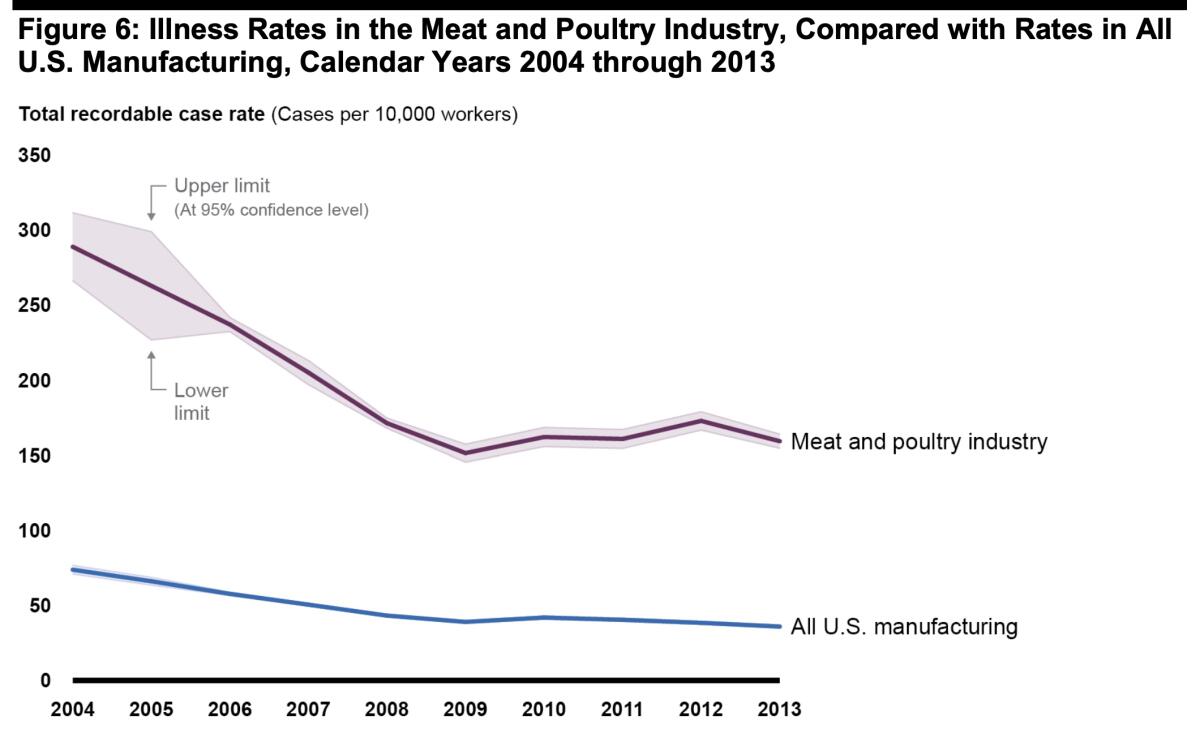
The plant was shut down indefinitely in mid-April, but later permitted to open in stages after it was visited by an inspection team from the Centers for Disease Control and Prevention. Smithfield also temporarily closed a plant in Martin City, Mo., which received raw material from the South Dakota plant.
Smithfield also contends that the lawsuit should be dismissed in light of President Trump’s April 28 executive order invoking the Defense Production Act to order meat processing plants to stay open.
“The President delegated to the Secretary of Agriculture all authority to ensure that meat processors continue operations,” the company said in its April 29 filing. That “effectively ends this lawsuit.”
The plaintiffs disagree. They observe that the Agriculture Department has no expertise or inclination to oversee worker safety, only the wholesomeness of the plants’ products.
By removing unemployment benefits, states are forcing workers to risk their lives
“This is an attempt by Smithfield to claim it can self-regulate,” says David Muraskin of Public Justice, which is representing the plaintiffs. “The companies will get free hands to do whatever they want, and we’ve seen what happens when that occurs.”
Among the allegations in the lawsuit, masks were provided only to certain workers in the plant, and in those cases only one surgical mask per week; replacement would be issued only if the first one broke. Workers were packed together “in cramped spaces along production lines.” Plexiglass dividers have been placed between some workers, but don’t cover all workers’ faces.
With the closure of other Smithfield plants, the lawsuit says, the production line at Milan has been sped up. Smithfield has erected some hand-cleaning stations, but hasn’t given workers extra break time to use them. The Workers Alliance says that workers are given three breaks totaling 60 minutes on every 11-hour shift, so skimpy that some wear diapers on the line to avoid having to leave for a bathroom break.
There’s reason to doubt that Upton Sinclair would be surprised by conditions in 21st century meatpacking plants.
In “The Jungle,” he wrote that in every section of the plant “the workers...had their own peculiar diseases....scarce a one of these that had not some spot of horror on his person. Let a man so much as scrape his finger pushing a truck in the pickle rooms, and he might have a sore that would put him out of the world.”
Many of the workers who wielded knives and hooks had lost the use of their thumbs to repeated injuries. Among those working in the “cooking rooms, in the midst of steam and sickening odors...the germs of tuberculosis might live for two years.”
Beef-lugging, or carrying 200-pound carcasses about, “wore out the most powerful men in a few years.” For those who worked in refrigerated room, the “special disease was rheumatism; the time limit that a man could work in the chilling rooms was said to be five years.”
Nurses know how unprepared we were for COVID-19. They’re getting punished for speaking out.
“The Jungle,” published when Sinclair was 26, made the reputation of a writer who would run for governor of California in 1934 on a radical antipoverty platform, only to be trounced by an establishment Republican.
Sinclair aimed in “The Jungle” to tell the story not so much of the meatpacking industry but more generally of the immigrant experience in Chicago’s lower depths.
As it happens, meat and poultry factories are still heavily served by immigrant labor. “The parallels are really striking,” Michaels told me. “Immigrants are looked down upon as less important and not like good Americans.”
Smithfield spokespersons and South Dakota Gov. Kristi Noem, who has refused to issue stay-at-home orders in her state, tried to blame the Sioux Falls outbreak on immigrant lifestyles.
“A lot of these folks who work at this plant live in the same community, the same buildings, sometimes in the same apartments,” Noem told Fox News.
“The Jungle’s” reception, as it turned out, proved Sinclair’s point that members of the immigrant community were invisible men and women.
Public outrage focused more on whether the meatpacking plants’ products were healthful and clean than on the inhumane conditions in the plants. The reforms prompted by the book concerned the former, not the latter. In a famous lament, Sinclair observed, “I aimed at the public’s heart, and by accident I hit it in the stomach.”
Trump’s evisceration of labor protections will continue under Labor Department nominee Scalia
In Sinclair’s time, the government didn’t provide regulatory oversight worth a nickel. By many accounts, it still doesn’t.
The Occupational Safety and Health Administration, a unit of the Labor Dept., employs about 2,000 inspectors to oversee America’s 8 million workplaces, including some 53,000 meat and poultry plants. OSHA says it conducts about 32,000 inspections a year, equivalent to 0.4% of total worksites. “Federal OSHA is a small agency,” its website explains.
The Trump Administration and Congress have kept it small. Over the last four fiscal years the agency’s budget has increased by only 5.2%, to $581.8 million in the current fiscal year.
The evidence is strong that meat and poultry plants warrant more stringent oversight than other manufacturing facilities. In a 2016 audit, the Government Accountability Office found that even though illness and injury rates had declined in the previous dozen years, the rates still consistently exceeded those of all U.S. manufacturing.
Workers continue to face such hazardous conditions as “musculoskeletal discorders [chiefly repetitive stress injuries], exposure to chemicals and pathogens, and traumatic injuries from machines and tools.”
Secretary of Labor Eugene Scalia (son of the late Supreme Court Justice Antonin Scalia) has claimed there is little OSHA can do because it has no standard covering airborne infectious diseases. But that’s because Trump halted work on a rule that had begun to take form under Michaels. The rule was originally crafted to cover healthcare workers, but Michaels says nothing in federal law would prevent OSHA from applying the rule to all workplaces now.
“The OSHA law says that employers are required to provide a workplace free of recognized serious hazards,” Michaels told me. “The most recognized serious hazard in the United States right now is coronavirus.”
The Labor Department could signal that it would ride herd on employers who flout coronavirus safety standards. But it has done just the opposite. On April 28, the department’s labor solicitor, Kate O’Scannlain, and Loren Sweatt, a Labor Department official who is effectively the current OSHA boss , stated that the agency would be tolerant of meat and poultry processors that “demonstrated good faith attempts” to comply with agency guidance on COVID-19 safety.
(OSHA has operated without an official director for nearly two years; former FedEx executive Scott Mugno withdrew his name from consideration last May after spending 19 months waiting in vain for a Senate confirmation vote.)
OSHA said it would apply “enforcement discretion” in meat and poultry safety cases. Employers who determine that some antiexposure measures “are not feasible in the context of specific plants and circumstances” should “document why that is the case.”
The Labor Department said that under the Defense Production Act, states and localities no longer have the authority to shut down a meat processing plant or require that it comply with state or local rules.
The department even said it would consider joining employers to defend against lawsuits brought by employees “for alleged workplace exposures.”
“You have to ask Scalia, ‘Which side are you on?’” Michaels says. “OSHA’s job is to protect workers, not to protect corporations from lawsuits.”
We’ve asked before and ask again: Is the Department of Labor really just a Department of Employer Rights in disguise?
More to Read
Inside the business of entertainment
The Wide Shot brings you news, analysis and insights on everything from streaming wars to production — and what it all means for the future.
You may occasionally receive promotional content from the Los Angeles Times.

